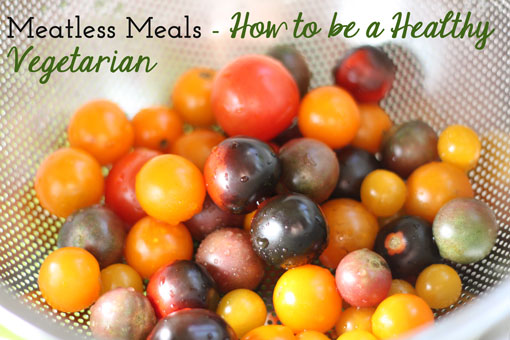Balanced Living
Meatless Meals – How to be a Healthy Vegetarian
Posted by Arja on August 9 in Nutrition
Yes, you read that correctly. “A healthy vegetarian”, implying that not all vegetarians are healthy. There’s a lot of information out there about the health benefits of eating more plants and less animal products. For the record, I agree wholeheartedly, and while my family and I are not vegans 100% of the time, we do eat a number of plant-based meals and have dramatically reduced our dependence on animal products. What I’m seeing, however, is a growing trend of people incorporating more vegetarian and vegan meals into their diets who are on their way to becoming unhealthy vegetarians.

Adopting a healthy, plant-based lifestyle involves more than just saying no to a steak and eating the potatoes, mushrooms, and onions instead. I see a lot of clients who are vegetarians with health issues that stem directly from their diet. There are numerous studies that cite the many health benefits of consuming fewer animal products, but if you’re trading your chicken breast for a larger serving of pasta, or not paying attention to your protein intake, you’re not really doing your body any favours.
I encourage all my clients to lessen their dependence on meat and animal products in general, and while not all people can thrive on a purely vegan diet (there is no one diet that will work for everyone in my opinion) anyone who is looking to eat more vegetarian or vegan meals should keep a few things in mind:
Eat more green veggies. You’ve heard it before, but green veg is the champion of all the vegetables. Spinach, chard, kale, collards, and all the other dark leafy greens – make a salad, add them to shakes, juice them, or sauté them. However you do it, just eat them. Every day. And while you’re at it, don’t forget broccoli, Brussels sprouts, and green beans.
Just because it’s vegan or vegetarian, doesn’t mean it’s good for you. A prime example of this are all those packaged, processed meat replacement products. Veggie dogs, veggie burgers, ground veggie meat… These “foods” are highly processed, often high in sodium, and really not good for you at all. Want a veggie burger? Make it yourself. It’s not hard, and there are a lot of different combinations that you can try. Also included on this list – sweets and other baked goods. That may be a vegan cinnamon roll or doughnut that you’re eating, but that doesn’t necessarily mean it’s healthy. Treats are treats. Eat them occasionally and don’t try to kid yourself that you’re eating something healthy based on a label.
Go heavy on the vegetables and light on the grains. If all of your vegetarian or vegan meals are heavy on breads, pastas, grains, or other starchy carbs, but light on the leafy greens, colourful vegetables, and other nutrient dense foods you may find yourself starting to bulk up in the wrong way. Quinoa is good for you, don’t get me wrong, but if your lunch bowl consists of a big bowl of mostly quinoa or quinoa pasta, and not a whole lot of other vegetables you’re missing out on some serious nutrient goodness. When you do eat grains, make sure they’re whole grains. Skip white flour, white pasta, white rice, and all the other refined stuff. Use “meatless Mondays” as a reason to serve up a variety of different vegetables, not as an excuse to have a heaping bowl of pasta.
Don’t forget your protein. This is especially important if you’re a vegan and not consuming any eggs, fish, or dairy. Protein (and some of the specific amino acids you get from it) contains the building blocks for many things in your body –it supports your immune system, good mental health, and energy amongst many other things. It’s important to not only get enough of it, but to also get “complete” proteins, meaning all of the essential amino acids. Beans or grains alone are not a complete protein, but can combine to become complete. It’s worth learning more about this to make choices that give you all that you need either alone, or in combination with other foods.
Avoid anemia. Iron and B12 are both more readily available to the body through animal sources, but that doesn’t mean that if you’re a vegetarian or vegan that you’ll become deficient in either. Fermented foods, brewer’s yeast, and some sea vegetables contain B12 that vegans can consume, but amounts can vary and it’s not clear yet if the form is readily absorbed by the body. It’s probably best for strict vegans to supplement. Iron is available from many plant-based sources, and to increase absorption pair with something high in vitamin C.
Whether you are looking to become a full-time vegetarian or vegan, or are just looking to reduce your dependence on animal products, know that you’re doing your body (and the planet!) a lot of good!
Just put your focus on whole foods, clean eating, and don’t fall prey to the health washing claims on some packaged foods. Knowledge is power!
Eat to feel good!



